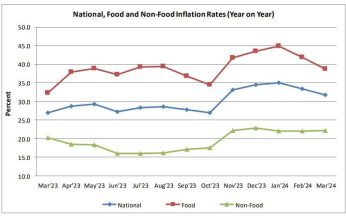Coal can be alternative to fuel wood—research
A research done by geologist Grain Malunga has shown that enhanced domestic household use of coal can help to reduce the rate of deforestation in the country.
The geologist conducted an experiment at Kasikizi Coal Mine in Mwankenja Basin, Karonga by using coal in a domestic stove the same way charcoal is used.
It was found that using a start-up coal to charcoal mixture of three to one, it took about five minutes to light the coal while using cardboard paper/ordinary paper or ordinary wood, it took about 15 to 20 minutes.

Reads the research in part: “In other words to light one kilogramme of coal, one requires about 300 grammes of charcoal.
“This is enough to cook up to 1.5 hours. Cooking using coal saves a lot of charcoal and by extension minimises deforestation.”
The research found that to produce one tonne of coal requires nine tonnes of wood and that one tonne of coal saves 27 tonnes of wood.
“High ash content slows down combustion. It is recommended that direct use of mineral coal should be with the one that contains less than 20 percent ash content,” reads the research.
The research recommends the use of Philips fan stove compared to the traditional cook stove.
It said Philips fan stove performed better than the traditional stove because of its use of fan ventilation.
“There was more heat loss in the traditional stove than the fan stove. In terms of affordability, the traditional stove is far much cheaper and less energy efficient,” reads the research.
In an interview, Malunga cautioned that domestic use of coal should be guided by ventilation, stove design, fuel quality and stove maintenance and operation.
“It [coal] has potential to introduce carcinogenic emissions and toxic elements such as fluorine, arsenic, lead, selenium and mercury, which affect environmental health,” he said.
Malunga said exposure to these elements can be reduced by processing the coal and developing cautious behaviour of avoiding inhalations and encouraging outdoor use.
“It is important to note that indoor emissions from household combustion of coal are carcinogenic to humans and can cause liver cancer,” he said.
Last week, President Lazarus Chakwera said his administration will scale up use of alternative renewable energy sources.
“We will be promoting the development and adoption of alternative cooking energies such as briquettes, biogas and liquid petroleum gas as well as the growing of bamboos and fast-growing trees for sustainable charcoal production,” he said.
Electricity, for primary cooking, has a national penetration rate of two percent due to low household income and availability while the current national electricity access rate is 11 percent with urban areas having 42 percent and rural areas four percent.





